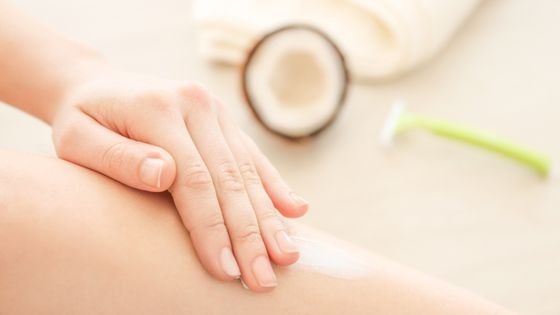Does coconut oil help a sunburn?

Do you want to know if coconut oil helps a sunburn? A sunburn can be excruciating and uncomfortable.
Not only is sunburn unsightly, but it can also be dangerous. Sunburns increase your risk of skin cancer. But does it help? Let's take a look at what our doctor says.
Does coconut oil help a sunburn?
No, coconut oil does not help sunburns. It may make them worse by trapping the heat and exacerbating the inflammation. Sunburns should be treated with cold compresses, aloe vera gel, and over-the-counter pain relief medication. See a dermatologist if the burn is severe.
Coconut oil is often a cure-all for everything from dry skin to dandruff, but its benefits are vastly overestimated. Regarding sunburn, coconut oil can do more harm than good.
The oil will not heal the burn or relieve the pain and may even worsen the condition. If you're looking for a way to soothe sunburn, reach for an aloe vera gel instead.
Aloe vera is a natural anti-inflammatory that can help to cool and hydrate the skin. Applied topically, it can provide immediate relief from sunburn pain. For the best results, look for a gel that contains at least 90% aloe vera.
7 Tips for treating sunburns
We've all been there...you spend too much time in the sun, and before you know it, you're red as a lobster! But don't worry. There are plenty of ways to treat sunburn so you can get relief fast. Keep reading for some tips from our experts.
1) Take a cool shower or bath
This will help to take the heat out of your sunburn and will also help to hydrate your skin. Just be sure not to stay in the water for too long, as this can dry your skin and worsen the burning sensation.
2) Apply a cold compress to the affected area
You can use a clean cloth soaked in cool water or even wrap an ice pack in a towel and apply it to your skin for a few minutes at a time.
3) Moisturize, moisturize, moisturize!
Sunburns can dry out your skin, so it's essential to replenish lost moisture by applying a liberal amount of lotion, aloe vera gel, or another moisturizer to the affected area. Avoid any products containing petroleum jelly or other synthetic ingredients, as these can trap heat and worsen your sunburn.
4) Drink plenty of fluids
When you have a sunburn, your body works hard to heal the damage that has been done. This process can lead to dehydration, so it's essential to make sure that you're drinking enough water throughout the day.
5) Take ibuprofen if you're in pain
Sunburns can be very painful, so if over-the-counter pain relievers aren't doing the trick, you may consider taking ibuprofen (Advil or Motrin). Just be sure not to take more than the recommended dosage—too much ibuprofen can lead to stomach ulcers.
6) Stay out of the sun!
Once you have a sunburn, it's essential to protect the affected area from further damage by staying out of direct sunlight until it has healed completely. If you must go outside, cover up with clothing or sunscreen with at least SPF 30.
7) Consider seeing a doctor if your sunburn is severe
If you have blisters or your skin is peeling off in large sheets, it's essential to see a doctor as soon as possible, as these could be signs of second-degree burns requiring medical attention.
We hope these tips help you get relief from your sunburn fast! Always consult a doctor if you have any concerns about your health—and have fun in the sun safely!
When to see a doctor for a sunburn
With warmer weather on the horizon, many of us are eager to spend more time outdoors. However, it's important to remember to protect your skin from the sun's harmful ultraviolet (UV) rays, even when it's cloudy!
Anyone can get sunburned, but certain people are more susceptible to skin cancer due to too much sun exposure.
If you have any of the following risk factors, it's essential to be extra vigilant about protecting your skin and seeing a doctor for regular skin examinations:
- A family history of skin cancer
- A personal history of skin cancer
- A fair complexion that freckles or burns easily
- A large number of moles or abnormal moles
- A history of sunburns, particularly in childhood
If you notice any changes in your skin, such as new growths, changes in existing moles, or persistent itching or redness, be sure to see a doctor right away. And if you develop a sunburn despite your best efforts to prevent one, it's also a good idea to see a doctor—especially if the sunburn is severe.
Conclusion
Most people will experience at least one sunburn in their lifetime—but some people are at greater risk for developing skin cancer due to too much sun exposure.
If you have any risk factors for skin cancer, it's essential to be extra vigilant about protecting your skin and seeing a doctor for regular examinations.
And if you develop a sunburn despite your best efforts at prevention, home treatment is usually all needed to relieve discomfort and promote healing.
However, in some cases, it's necessary to see a doctor for treatment—especially if the burn is severe or covers a large area of your body. So pay attention to your body and see a doctor if you have any concerns about your health!
DISCLAIMER: buildyourbody.org does not provide medical advice, examination, or diagnosis.
Medically reviewed and approved by Nataniel Josue M D.

